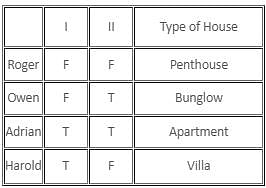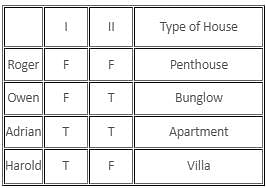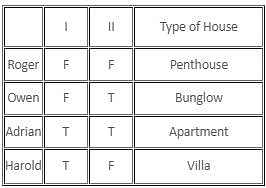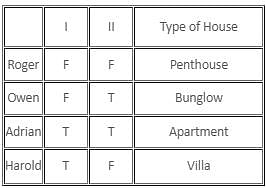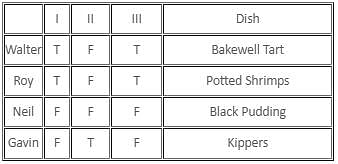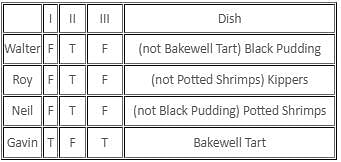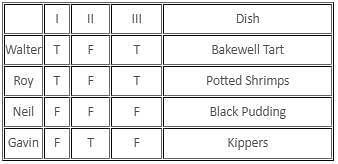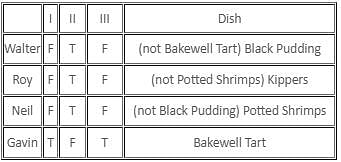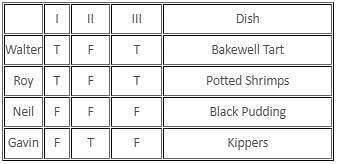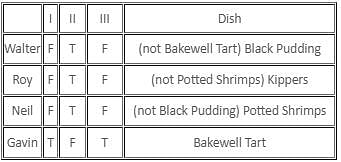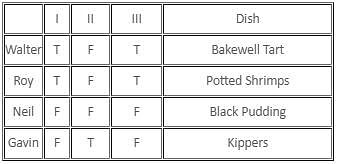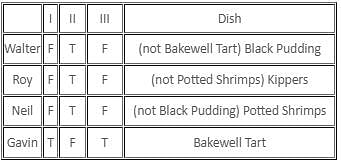This EduRev document offers 15 Multiple Choice Questions (MCQs) from the topic Binary Logic (Level - 2). These questions are of Level - 2 difficulty and will assist you in the preparation of CAT & other MBA exams. You can practice/attempt these CAT Multiple Choice Questions (MCQs) and check the explanations for a better understanding of the topic.
Question for Practice Questions Level 2: Binary Logic
Try yourself:Directions: Study the following information and answer the question that follows.
Samuel, Gerald and Leslie are three persons, each travelling in a different bus from a different city among City-A, City-B and City-C. The traveller of one of the buses always lies, that of the other always speaks the truth, while the remaining one alternates between speaking the truth and lying, in any order. When asked about the respective buses from which they were, each of their representative, i.e. Samuel, Gerald and Leslie made the following statements:
Samuel —
Statement I: We always speak the truth.
Statement II: The bus in which Leslie is traveling is not coming from City-A.
Gerald —
Statement I: Leslie is the truth-teller.
Statement II: We are coming from City-B.
Leslie —
Statement I: Gerald is not the alternator.
Statement II: I am from City-A.
Who among the three always tells the truth?
Explanation
Let us look at the first statement of Gerald - "Leslie is the truth-teller". This statement implies that Gerald is not the truth-teller as there is only one truth-teller, and if Leslie is the truth-teller, then Gerald cannot be the truth-teller.
Thus, Gerald can either be an alternator or liar. ......(1)
Let us see the first statement of Leslie - "Gerald is not the alternator". If Leslie is the truth-teller, then Gerald will be a liar, in which case Leslie cannot be the truth-teller. ......(2)
From (1) and (2), Samuel should be the truth-teller. Now, Leslie can either be the liar or the alternator.
Case (i)
If Leslie is an alternator, his first statement would be true and second statement would be false, and both the statements of Gerald would be false. Hence, it is a possible case. In such a case, the buses of each of the people cannot be determined.
Case (ii)
If Leslie is a liar, both his statements would be false, and the first statement of Gerald would be false and his second statement would be true. As there are no contradictions, this is also a possible case.
In this case, Gerald would be coming from City-B, Samuel would be coming from City-A and Leslie would be coming from City-C.
Hence, Samuel is the truth-teller.
Report a problem
Question for Practice Questions Level 2: Binary Logic
Try yourself:Directions: Study the following information and answer the question that follows.
Samuel, Gerald and Leslie are three persons, each travelling in a different bus from a different city among City-A, City-B and City-C. The traveller of one of the buses always lies, that of the other always speaks the truth, while the remaining one alternates between speaking the truth and lying, in any order. When asked about the respective buses from which they were, each of their representative, i.e. Samuel, Gerald and Leslie made the following statements:
Samuel —
Statement I: We always speak the truth.
Statement II: The bus in which Leslie is traveling is not coming from City-A.
Gerald —
Statement I: Leslie is the truth-teller.
Statement II: We are coming from City-B.
Leslie —
Statement I: Gerald is not the alternator.
Statement II: I am from City-A.
The person in the bus coming from which of the following cities, always alternates between speaking the truth and a lie?
Explanation
Let us look at the first statement of Gerald - "Leslie is the truth-teller". This statement implies that Gerald is not the truth-teller as there is only one truth-teller, and if Leslie is the truth-teller, then Gerald cannot be the truth-teller.
Thus, Gerald can either be an alternator or liar. ......(1)
Let us see the first statement of Leslie - "Gerald is not the alternator". If Leslie is the truth-teller, then Gerald will be a liar, in which case Leslie cannot be the truth-teller. ......(2)
From (1) and (2), Samuel should be the truth-teller. Now, Leslie can either be the liar or the alternator.
Case (i)
If Leslie is an alternator, his first statement would be true and second statement would be false, and both the statements of Gerald would be false. Hence, it is a possible case. In such a case, the buses of each of the people cannot be determined.
Case (ii)
If Leslie is a liar, both his statements would be false, and the first statement of Gerald would be false and his second statement would be true. As there are no contradictions, this is also a possible case.
In this case, Gerald would be coming from City-B, Samuel would be coming from City-A and Leslie would be coming from City-C.
As seen above, the city from which the alternator is coming cannot be determined.
Report a problem
Question for Practice Questions Level 2: Binary Logic
Try yourself:Directions: Study the following information and answer the question that follows.
Samuel, Gerald and Leslie are three persons, each travelling in a different bus from a different city among City-A, City-B and City-C. The traveller of one of the buses always lies, that of the other always speaks the truth, while the remaining one alternates between speaking the truth and lying, in any order. When asked about the respective buses from which they were, each of their representative, i.e. Samuel, Gerald and Leslie made the following statements:
Samuel —
Statement I: We always speak the truth.
Statement II: The bus in which Leslie is traveling is not coming from City-A.
Gerald —
Statement I: Leslie is the truth-teller.
Statement II: We are coming from City-B.
Leslie —
Statement I: Gerald is not the alternator.
Statement II: I am from City-A.
Who among the following is coming from City-C?
Explanation
Let us look at the first statement of Gerald - "Leslie is the truth-teller". This statement implies that Gerald is not the truth-teller as there is only one truth-teller, and if Leslie is the truth-teller, then Gerald cannot be the truth-teller.
Thus, Gerald can either be an alternator or liar. ......(1)
Let us see the first statement of Leslie - "Gerald is not the alternator". If Leslie is the truth-teller, then Gerald will be a liar, in which case Leslie cannot be the truth-teller. ......(2)
From (1) and (2), Samuel should be the truth-teller. Now, Leslie can either be the liar or the alternator.
Case (i)
If Leslie is an alternator, his first statement would be true and second statement would be false, and both the statements of Gerald would be false. Hence, it is a possible case. In such a case, the buses of each of the people cannot be determined.
Case (ii)
If Leslie is a liar, both his statements would be false, and the first statement of Gerald would be false and his second statement would be true. As there are no contradictions, this is also a possible case.
In this case, Gerald would be coming from City-B, Samuel would be coming from City-A and Leslie would be coming from City-C.
Hence, answer option 4 is correct.
Report a problem
Question for Practice Questions Level 2: Binary Logic
Try yourself:Directions: Study the following information and answer the question that follows.
Samuel, Gerald and Leslie are three persons, each travelling in a different bus from a different city among City-A, City-B and City-C. The traveller of one of the buses always lies, that of the other always speaks the truth, while the remaining one alternates between speaking the truth and lying, in any order. When asked about the respective buses from which they were, each of their representative, i.e. Samuel, Gerald and Leslie made the following statements:
Samuel —
Statement I: We always speak the truth.
Statement II: The bus in which Leslie is traveling is not coming from City-A.
Gerald —
Statement I: Leslie is the truth-teller.
Statement II: We are coming from City-B.
Leslie —
Statement I: Gerald is not the alternator.
Statement II: I am from City-A.
Who among the following is a liar?
Explanation
Let us look at the first statement of Gerald - "Leslie is the truth-teller". This statement implies that Gerald is not the truth-teller as there is only one truth-teller, and if Leslie is the truth-teller, then Gerald cannot be the truth-teller.
Thus, Gerald can either be an alternator or liar. ......(1)
Let us see the first statement of Leslie - "Gerald is not the alternator". If Leslie is the truth-teller, then Gerald will be a liar, in which case Leslie cannot be the truth-teller. ......(2)
From (1) and (2), Samuel should be the truth-teller. Now, Leslie can either be the liar or the alternator.
Case (i)
If Leslie is an alternator, his first statement would be true and second statement would be false, and both the statements of Gerald would be false. Hence, it is a possible case. In such a case, the buses of each of the people cannot be determined.
Case (ii)
If Leslie is a liar, both his statements would be false, and the first statement of Gerald would be false and his second statement would be true. As there are no contradictions, this is also a possible case.
In this case, Gerald would be coming from City-B, Samuel would be coming from City-A and Leslie would be coming from City-C.
We cannot determine which city the liar is coming from.
Hence, answer option 4 is correct.
Report a problem
Question for Practice Questions Level 2: Binary Logic
Try yourself:Directions: Study the following information and answer the question that follows.
There are four friends - Roger, Owen, Adrian, and Harold - each of whom lives in exactly one type of house amongst bunglow, apartment, penthouse and villa, not necessarily in the same order. No two friends live in the same type of house. Each person gives two replies to any question asked to them. At least one person among them always speaks the truth and at least one person always lies. There is at least one person who always alternates between telling the truth and lying, in any order.
When asked about the names of the friends and the respective houses they live in, following were their replies:
Adrian: Roger lives in the penthouse.
Owen lives in the bunglow.
Harold: Adrian lives in the apartment.
I live in the penthouse.
Roger: I live in the bunglow.
Adrian lives in the bunglow.
Owen: I live in the villa.
Harold lives in the villa.
It is also known that Harold lives in the villa and a definite arrangement can be obtained from the statements given by each person.
Who among the following lives in the bunglow?
Explanation
It is known that Harold lives in the villa, which means that the 2nd statement made by Owen must be true, whereas the 2nd statement made by Harold must be false. As Roger says that he and Adrian both live in the bunglow, Roger cannot be the person who always speaks the truth, as each person lives in exactly one type of house and exactly one type of house is occupied by one friend. This means only Adrian can always speak the truth, as there must be at least one person who always speaks the truth.
We take this as the basis and get the arrangement as given below:

Hence, Owen lives in the bunglow, which means option 2 is correct.
Report a problem
Question for Practice Questions Level 2: Binary Logic
Try yourself:Directions: Study the following information and answer the question that follows.
There are four friends - Roger, Owen, Adrian, and Harold - each of whom lives in exactly one type of house amongst bunglow, apartment, penthouse and villa, not necessarily in the same order. No two friends live in the same type of house. Each person gives two replies to any question asked to them. At least one person among them always speaks the truth and at least one person always lies. There is at least one person who always alternates between telling the truth and lying, in any order.
When asked about the names of the friends and the respective houses they live in, following were their replies:
Adrian: Roger lives in the penthouse.
Owen lives in the bunglow.
Harold: Adrian lives in the apartment.
I live in the penthouse.
Roger: I live in the bunglow.
Adrian lives in the bunglow.
Owen: I live in the villa.
Harold lives in the villa.
It is also known that Harold lives in the villa and a definite arrangement can be obtained from the statements given by each person.
Who among the following always speaks the truth?
Explanation
It is known that Harold lives in the villa, which means that the 2nd statement made by Owen must be true, whereas the 2nd statement made by Harold must be false. As Roger says that he and Adrian both live in the bunglow, Roger cannot be the person who always speaks the truth, as each person lives in exactly one type of house and exactly one type of house is occupied by one friend. This means only Adrian can always speak the truth, as there must be at least one person who always speaks the truth.
We take this as the basis and get the arrangement as given below:

Adrian always speaks the truth.
Hence, answer option 3 is correct.
Report a problem
Question for Practice Questions Level 2: Binary Logic
Try yourself:Directions: Study the following information and answer the question that follows.
There are four friends - Roger, Owen, Adrian, and Harold - each of whom lives in exactly one type of house amongst bunglow, apartment, penthouse and villa, not necessarily in the same order. No two friends live in the same type of house. Each person gives two replies to any question asked to them. At least one person among them always speaks the truth and at least one person always lies. There is at least one person who always alternates between telling the truth and lying, in any order.
When asked about the names of the friends and the respective houses they live in, following were their replies:
Adrian: Roger lives in the penthouse.
Owen lives in the bunglow.
Harold: Adrian lives in the apartment.
I live in the penthouse.
Roger: I live in the bunglow.
Adrian lives in the bunglow.
Owen: I live in the villa.
Harold lives in the villa.
It is also known that Harold lives in the villa and a definite arrangement can be obtained from the statements given by each person.
Who always alternate(s) between telling the truth and lying?
Explanation
It is known that Harold lives in the villa, which means that the 2nd statement made by Owen must be true, whereas the 2nd statement made by Harold must be false. As Roger says that he and Adrian both live in the bunglow, Roger cannot be the person who always speaks the truth, as each person lives in exactly one type of house and exactly one type of house is occupied by one friend. This means only Adrian can always speak the truth, as there must be at least one person who always speaks the truth.
We take this as the basis and get the arrangement as given below:

Thus, it can be concluded that Harold and Owen alternate between telling the truth and lying.
Hence, answer option 3 is correct.
Report a problem
Question for Practice Questions Level 2: Binary Logic
Try yourself:Directions: Study the following information and answer the question that follows.
There are four friends - Roger, Owen, Adrian, and Harold - each of whom lives in exactly one type of house amongst bunglow, apartment, penthouse and villa, not necessarily in the same order. No two friends live in the same type of house. Each person gives two replies to any question asked to them. At least one person among them always speaks the truth and at least one person always lies. There is at least one person who always alternates between telling the truth and lying, in any order.
When asked about the names of the friends and the respective houses they live in, following were their replies:
Adrian: Roger lives in the penthouse.
Owen lives in the bunglow.
Harold: Adrian lives in the apartment.
I live in the penthouse.
Roger: I live in the bunglow.
Adrian lives in the bunglow.
Owen: I live in the villa.
Harold lives in the villa.
It is also known that Harold lives in the villa and a definite arrangement can be obtained from the statements given by each person.
Who lives in the apartment?
Explanation
It is known that Harold lives in the villa, which means that the 2nd statement made by Owen must be true, whereas the 2nd statement made by Harold must be false. As Roger says that he and Adrian both live in the bunglow, Roger cannot be the person who always speaks the truth, as each person lives in exactly one type of house and exactly one type of house is occupied by one friend. This means only Adrian can always speak the truth, as there must be at least one person who always speaks the truth.
We take this as the basis and get the arrangement as given below:

Thus, it can be concluded that Adrian lives in the apartment.
Hence, answer option 3 is correct.
Report a problem
Question for Practice Questions Level 2: Binary Logic
Try yourself:Directions: Study the following information and answer the question that follows.
Four friends, Walter, Roy, Neil, and Gavin, went to a restaurant together and each ordered a different dish amongst black pudding, kippers, potted shrimps and bakewell tart, not necessarily in the same order. It is given that each person ate only one dish each, which they had ordered. Each of them gives three replies to any question asked, which are alternately true or false, in any order. When asked to mention the name of the friend and the dish that they ate, they gave the following replies:
Walter:
Neil ate black pudding.
Gavin ate bakewell tart.
Roy ate potted shrimps.
Roy:
Walter ate bakewell tart.
Neil ate potted shrimps.
Gavin ate kippers.
Neil:
Gavin ate black pudding.
Roy ate kippers.
Walter ate potted shrimps.
Gavin:
Roy did not eat potted shrimps.
Walter ate bakewell tart.
Neil did not eat black pudding.
Who among the following ate black pudding?
Explanation
Each person alternates between a truth and a lie, then for three statements given by any person, the nature of the statements could be:
True, False, True
or
False, True, False
(i) Assume that the three statements given by Walter are in the order, True, False, True. Then, we get the following arrangement:

Here, all the three statements given by Neil become false. Hence, we'll try the second combination.
(ii) Assume that the three statements given by Walter are in the order False, True, False.
Then, we get the following arrangement:

Thus, Walter ate the black pudding.
Hence, answer option 1 is correct.
Report a problem
Question for Practice Questions Level 2: Binary Logic
Try yourself:Directions: Study the following information and answer the question that follows.
Four friends, Walter, Roy, Neil, and Gavin, went to a restaurant together and each ordered a different dish amongst black pudding, kippers, potted shrimps and bakewell tart, not necessarily in the same order. It is given that each person ate only one dish each, which they had ordered. Each of them gives three replies to any question asked, which are alternately true or false, in any order. When asked to mention the name of the friend and the dish that they ate, they gave the following replies:
Walter:
Neil ate black pudding.
Gavin ate bakewell tart.
Roy ate potted shrimps.
Roy:
Walter ate bakewell tart.
Neil ate potted shrimps.
Gavin ate kippers.
Neil:
Gavin ate black pudding.
Roy ate kippers.
Walter ate potted shrimps.
Gavin:
Roy did not eat potted shrimps.
Walter ate bakewell tart.
Neil did not eat black pudding.
Roy ate
Explanation
Each person alternates between a truth and a lie, then for three statements given by any person, the nature of the statements could be:
True, False, True
or
False, True, False
(i) Assume that the three statements given by Walter are in the order, True, False, True. Then, we get the following arrangement:

Here, all the three statements given by Neil become false. Hence, we'll try the second combination.
(ii) Assume that the three statements given by Walter are in the order False, True, False.
Then, we get the following arrangement:

Thus, it can be concluded that Roy ate Kippers.
Hence, answer option 4 is correct.
Report a problem
Question for Practice Questions Level 2: Binary Logic
Try yourself:Directions: Study the following information and answer the question that follows.
Four friends, Walter, Roy, Neil, and Gavin, went to a restaurant together and each ordered a different dish amongst black pudding, kippers, potted shrimps and bakewell tart, not necessarily in the same order. It is given that each person ate only one dish each, which they had ordered. Each of them gives three replies to any question asked, which are alternately true or false, in any order. When asked to mention the name of the friend and the dish that they ate, they gave the following replies:
Walter:
Neil ate black pudding.
Gavin ate bakewell tart.
Roy ate potted shrimps.
Roy:
Walter ate bakewell tart.
Neil ate potted shrimps.
Gavin ate kippers.
Neil:
Gavin ate black pudding.
Roy ate kippers.
Walter ate potted shrimps.
Gavin:
Roy did not eat potted shrimps.
Walter ate bakewell tart.
Neil did not eat black pudding.
Who among the following spoke the maximum number of truths?
Explanation
Each person alternates between a truth and a lie, then for three statements given by any person, the nature of the statements could be:
True, False, True
or
False, True, False
(i) Assume that the three statements given by Walter are in the order, True, False, True. Then, we get the following arrangement:

Here, all the three statements given by Neil become false. Hence, we'll try the second combination.
(ii) Assume that the three statements given by Walter are in the order False, True, False.
Then, we get the following arrangement:

Thus, it can be concluded that Gavin spoke spoke the maximum number of truths, i.e. 2.
Hence, answer option 4 is correct.
Report a problem
Question for Practice Questions Level 2: Binary Logic
Try yourself:Directions: Study the following information and answer the question that follows.
Four friends, Walter, Roy, Neil, and Gavin, went to a restaurant together and each ordered a different dish amongst black pudding, kippers, potted shrimps and bakewell tart, not necessarily in the same order. It is given that each person ate only one dish each, which they had ordered. Each of them gives three replies to any question asked, which are alternately true or false, in any order. When asked to mention the name of the friend and the dish that they ate, they gave the following replies:
Walter:
Neil ate black pudding.
Gavin ate bakewell tart.
Roy ate potted shrimps.
Roy:
Walter ate bakewell tart.
Neil ate potted shrimps.
Gavin ate kippers.
Neil:
Gavin ate black pudding.
Roy ate kippers.
Walter ate potted shrimps.
Gavin:
Roy did not eat potted shrimps.
Walter ate bakewell tart.
Neil did not eat black pudding.
Which of the following statements must be false?
Explanation
Each person alternates between a truth and a lie, then for three statements given by any person, the nature of the statements could be:
True, False, True
or
False, True, False
(i) Assume that the three statements given by Walter are in the order, True, False, True. Then, we get the following arrangement:

Here, all the three statements given by Neil become false. Hence, we'll try the second combination.
(ii) Assume that the three statements given by Walter are in the order False, True, False.
Then, we get the following arrangement:

It can be observed from the arrangement made above that option (4) is false.
Report a problem
Question for Practice Questions Level 2: Binary Logic
Try yourself:Directions: Study the following information and answer the question that follows.
Each of three persons, Henry, Daniel and Hugh, is travelling in a different train coach among Coach-A, Coach-B and Coach-C, not necessarily in the same order. Among the three persons, one is a truth-teller, i.e. he always speaks the truth, another is a liar, i.e. he always lies and the remaining person is an alternator, i.e. he always alternate between telling the truth and lying, in any order.
The three of them made the following statements:
Henry: Daniel is not the alternator.
The person travelling in a Coach-B is a truth-teller.
Daniel: The person travelling in Coach-C is an alternator.
I am the truth-teller.
Hugh: Henry is not travelling in Coach-A.
Daniel is an alternator.
Which train coach is Hugh travelling in?
Explanation
Let Henry be the truth-teller. From Henry's first statement, Daniel is not the alternator. Hence, Daniel must be the liar. As per Henry's second statement, Henry must be travelling in Coach-B because he is the truth-teller.
Since Daniel is a liar, from his first statement, the alternator is not travelling in Coach-C. Hence, the alternator must be travelling in Coach-A. The liar must be travelling in Coach-C. In this case, Hugh must be the alternator. Hugh's second statement is false and first statement is true. Hence, this is one possible case.
Let Daniel be the truth-teller. From Daniel's first statement, the alternator is travelling in Coach-C. Since Daniel is the truth-teller, Henry's first statement is true. Hence, Henry must be the alternator. His second statement must be false. Hence, the truth-teller is not travelling in Coach-B. Since the alternator is travelling in Coach-C, the truth-tellers is travelling in Coach-A and the liar must be travelling in Coach-B. Since Daniel is the truth-teller and Henry is the alternator, Hugh must be the liar. However, Hugh's first statement is true as Henry is not travelling in Coach-A (since Henry is the alternator, he must be travelling in Coach-C). Hence, Hugh cannot be the liar. Therefore, this case is not possible.
Let Hugh be the truth-teller. Daniel is the alternator and Henry is the liar. Daniel's second statement is false and hence, his first statement must be true. Therefore, the alternator is travelling in Coach-C. Since Henry is the liar, the truth-teller cannot be travelling in Coach-B. Hence, the truth-teller must be travelling in Coach-A and the liar must be travelling in Coach-B. This is one possible case.

Thus, it can be concluded that Hugh is travelling in Coach-A.
Hence, answer option 1 is correct.
Report a problem
Question for Practice Questions Level 2: Binary Logic
Try yourself:Directions: Study the following information and answer the question that follows.
Each of three persons, Henry, Daniel and Hugh, is travelling in a different train coach among Coach-A, Coach-B and Coach-C, not necessarily in the same order. Among the three persons, one is a truth-teller, i.e. he always speaks the truth, another is a liar, i.e. he always lies and the remaining person is an alternator, i.e. he always alternate between telling the truth and lying, in any order.
The three of them made the following statements:
Henry: Daniel is not the alternator.
The person travelling in a Coach-B is a truth-teller.
Daniel: The person travelling in Coach-C is an alternator.
I am the truth-teller.
Hugh: Henry is not travelling in Coach-A.
Daniel is an alternator.
Who among the following definitely made at least one true statement?
Explanation
Let Henry be the truth-teller. From Henry's first statement, Daniel is not the alternator. Hence, Daniel must be the liar. As per Henry's second statement, Henry must be travelling in Coach-B because he is the truth-teller.
Since Daniel is a liar, from his first statement, the alternator is not travelling in Coach-C. Hence, the alternator must be travelling in Coach-A. The liar must be travelling in Coach-C. In this case, Hugh must be the alternator. Hugh's second statement is false and first statement is true. Hence, this is one possible case.
Let Daniel be the truth-teller. From Daniel's first statement, the alternator is travelling in Coach-C. Since Daniel is the truth-teller, Henry's first statement is true. Hence, Henry must be the alternator. His second statement must be false. Hence, the truth-teller is not travelling in Coach-B. Since the alternator is travelling in Coach-C, the truth-tellers is travelling in Coach-A and the liar must be travelling in Coach-B. Since Daniel is the truth-teller and Henry is the alternator, Hugh must be the liar. However, Hugh's first statement is true as Henry is not travelling in Coach-A (since Henry is the alternator, he must be travelling in Coach-C). Hence, Hugh cannot be the liar. Therefore, this case is not possible.
Let Hugh be the truth-teller. Daniel is the alternator and Henry is the liar. Daniel's second statement is false and hence, his first statement must be true. Therefore, the alternator is travelling in Coach-C. Since Henry is the liar, the truth-teller cannot be travelling in Coach-B. Hence, the truth-teller must be travelling in Coach-A and the liar must be travelling in Coach-B. This is one possible case.

In both the cases, Hugh spoke at least one true statement.
Hence, answer option 3 is correct.
Report a problem
Question for Practice Questions Level 2: Binary Logic
Try yourself:Directions: Study the following information and answer the question that follows.
Each of three persons, Henry, Daniel and Hugh, is travelling in a different train coach among Coach-A, Coach-B and Coach-C, not necessarily in the same order. Among the three persons, one is a truth-teller, i.e. he always speaks the truth, another is a liar, i.e. he always lies and the remaining person is an alternator, i.e. he always alternate between telling the truth and lying, in any order.
The three of them made the following statements:
Henry: Daniel is not the alternator.
The person travelling in a Coach-B is a truth-teller.
Daniel: The person travelling in Coach-C is an alternator.
I am the truth-teller.
Hugh: Henry is not travelling in Coach-A.
Daniel is an alternator.
If Henry is not the liar, then who is the truth-teller?
Explanation
Let Henry be the truth-teller. From Henry's first statement, Daniel is not the alternator. Hence, Daniel must be the liar. As per Henry's second statement, Henry must be travelling in Coach-B because he is the truth-teller.
Since Daniel is a liar, from his first statement, the alternator is not travelling in Coach-C. Hence, the alternator must be travelling in Coach-A. The liar must be travelling in Coach-C. In this case, Hugh must be the alternator. Hugh's second statement is false and first statement is true. Hence, this is one possible case.
Let Daniel be the truth-teller. From Daniel's first statement, the alternator is travelling in Coach-C. Since Daniel is the truth-teller, Henry's first statement is true. Hence, Henry must be the alternator. His second statement must be false. Hence, the truth-teller is not travelling in Coach-B. Since the alternator is travelling in Coach-C, the truth-tellers is travelling in Coach-A and the liar must be travelling in Coach-B. Since Daniel is the truth-teller and Henry is the alternator, Hugh must be the liar. However, Hugh's first statement is true as Henry is not travelling in Coach-A (since Henry is the alternator, he must be travelling in Coach-C). Hence, Hugh cannot be the liar. Therefore, this case is not possible.
Let Hugh be the truth-teller. Daniel is the alternator and Henry is the liar. Daniel's second statement is false and hence, his first statement must be true. Therefore, the alternator is travelling in Coach-C. Since Henry is the liar, the truth-teller cannot be travelling in Coach-B. Hence, the truth-teller must be travelling in Coach-A and the liar must be travelling in Coach-B. This is one possible case.

If Henry is not the liar, then Henry is the truth-teller.
Hence, answer option 2 is correct.
Report a problem


